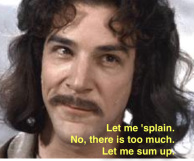
1) It can be done. It's being done. There is a backlash cresting against neuropop--"check out these brain pictures taken during the Rush Limbaugh's show!"--and this backlash is justified. (See Gary Marcus's nuanced take on this issue in the New Yorker.) But the fact that there is neuro-garbage in education does not mean we should dismiss brain science as an aid to the development of useful education practices.
2). These methods are indirect. (Technique 5, which concerns early identification of learning difficulties is not, but neither does it hold the promise of intervention.) Neuroscience will help education by informing behavioral theory, which we will then try to use to improve educational practice.
I draw two implications from the indirect path from neuroscience to education practice. First, when you hear someone say they’ve got a way to improve education that is “based on brain research” they are either (1) misinformed because it’s (at best) neuroscience that has informed a behavioral theory or (2) willfully trying to humbug you. I know certain people will find this implication insulting. Well, prove me wrong.
Second, the indirect path makes clear that this is complicated stuff. The pathway from neuroscientific data to educational practice will be crooked, moving back forth between neural and behavioral theory. We are going to creep and lurch toward useful applications, not sprint. Brilliant work is being conducted by people like Stan Dehaene, Daniel Ansari, and others, but payoffs will require patience.
As I've written about at length elsewhere, it's also important to bear in mind that not everything we care about in education is open to scientific investigation. I'm an enthusiastic booster of using scientific knowledge to improve educational practice. For that use to be effective, we need to bear in mind the limitations of science. The scientific method is very good for addressing some challenges in education and irrelevant to others. I think it's useful to be very explicit about each.
 RSS Feed
RSS Feed